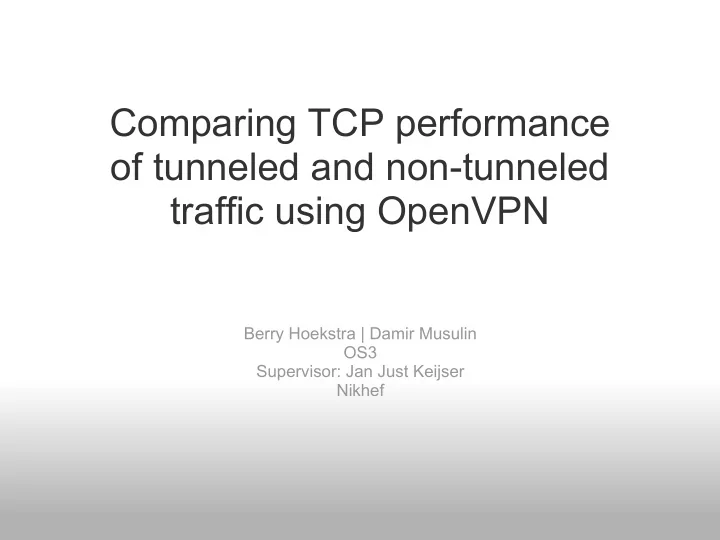

Comparing TCP performance of tunneled and non-tunneled traffic using OpenVPN Berry Hoekstra | Damir Musulin OS3 Supervisor: Jan Just Keijser Nikhef
Outline ● Introduction ● Approach ● Research ● Results ● Conclusion ● Questions?
Introduction ● Virtual Private Networks ○ Secure connection over an insecure network ○ SSL, IPsec, PPTP and L2TP are the most popular VPN solutions ○ Packets are encapsulated into packets on a lower layer ● OpenVPN ○ SSLv3/TLSv1 based VPN solution ○ Able to saturate 100 Mbps ○ Performance issues with 1 Gbps ■ Not much documented research available ○ OpenSSL for encryption ○ TUN/TAP driver for tunneling
Research Question ● "What are the causes of the network performance loss when using OpenVPN at Gigabit speed?" Sub-questions: ● What is the effect of using different encryption and authentication methods or parameters in OpenVPN? ● Is the same performance hit found on other OpenSSL- based tunnel solutions? ● Is the same performance hit found on other operating systems (e.g. FreeBSD)? ● What are the possibilities to mitigate slow OpenVPN network performance?
Problem definition ● Unable to saturate 1 Gbps over a VPN tunnel ○ Even with no encryption and signing with default settings ● Suspected culprits: ○ Inefficient cryptographic functions ○ OS context switching ○ TUN/TAP driver overhead ○ Context switching
OpenVPN packet flow
Methodology (1) ● Perform throughput measurements using Iperf ○ Using a control script ○ On different infrastructures ○ Perform OpenSSL speed tests ● What are the effects in throughput when: ○ Using different parameters ○ Using a different OpenSSL version ○ On a different infrastructure ○ On a different operating system ● Compare against similar VPN solutions ○ Vtun ● Source code analysis ○ OpenVPN / OpenSSL functionality ○ TUN/TAP driver
Lab setup ● Dell R210 ● Intel Xeon L3426 ○ 4/8 cores @ 1.87 GHz ● 8GB memory ● 2x Broadcom NIC Setup 1: Endpoint to endpoint Setup 2: Client to client
Methodology (2) ● Ciphers ○ Blowfish-128-CBC (default) ○ AES-128-CBC ○ AES-256-CBC ● HMAC signing ○ SHA-1 vs. MD5 ● Increasing TUN MTU sizes ○ Increases the block size towards OpenSSL ○ Encryption is done more efficient ● OpenVPN fragmentation options ○ Disabled, fragmentation is done at kernel level ○ Increases throughput! (between endpoints)
Results (1) Different ciphers: BF +150%, AES +30%-80%
Results (2) HMAC disabled +10%-20% Fragmentation disabled + ~40%
Results (3) Crypto impact on AES-256-CBC
Results (4) CentOS vs. FreeBSD: +50%-60%!
Results (5) OpenVPN vs. other OpenSSL solution: Vtun
Conclusions (1) ● OpenSSL is not capable to encrypt at 1 Gbps ○ BF-128 ~500 , AES-128 ~800 , AES-256 ~700 Mbps ● OpenVPN results show inefficient handling ○ Even with the internal fragmentation disabled ○ BF-128 ~400 , AES-128 ~200 , AES-256 ~155 Mbps ● OpenVPN needs high TUN MTU values for most efficient handling ● TUN/TAP driver plays a role in causing more overhead ○ Context switching ○ Mitigated by running in kernel space like IPsec
Conclusions (2) ● Tunnel performance can be optimized ○ Only on endpoint to endpoint setups ○ Hard to improve performance on routed setup ■ Clients deliver packets with a small MTU to endpoints ● Fragmentation options matters ○ Only for endpoint to endpoint setups ● FreeBSD shows a throughput increase of ~80% ○ Due to inefficient FIPS version of OpenSSL on CentOS ■ Fixed in OpenSSL 1.0.0 (default in Fedora) ○ Against CentOS, FreeBSD still outperforms with 50% to 60% ■ Using the same OpenSSL version
Conclusions (3) "What are the causes of the network performance loss when using OpenVPN at Gigabit speed?" ● There is a relation between the OpenSSL version and OpenVPN throughput ● Encryption routines of OpenVPN are inefficient ● OpenVPN fragmentation options cause a lot of overhead ○ Calculation, reassemble, and sequence no. administration ● Different performance measured on different operating systems ● OpenVPN source code contains a lot of branching ○ if {..} else {..} if {..} else {..} if {..} else {..} if {..} else {..} ○ Performance hit on CPU
Future work ● Hardware acceleration ○ AES-NI instruction set ○ Graphics cards ○ Cryptographic cards ● Kernel Mode Linux ○ Eliminate context switching ● TAP-Win32 driver ● Profiler ○ Low level Linux performance counters ○ Steap learning curve ● CPU affinity ○ No multi-socket hardware available ● 10 Gbps performance measurements ○ TCP Tuning is needed to get near-linespeed ○ Look into UDP offloading
Questions?
Recommend
More recommend